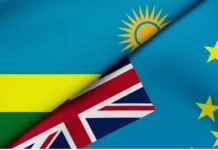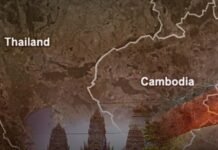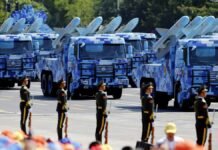Asad Ali
Afghanistan is known as the graveyard of great powers. First Soviet Union (USSR) and now the United States have tasted defeat despite fighting for two decades and having the world’s best military equipment.
The US came to Afghanistan after terrorist attacks on the World Trade Centre in 2001, with an aim to eradicate Al-Qaeda and other such organizations like the Afghan Taliban.
After spending billions of dollars, the successive US administrations from President Bush to Biden, accomplished nothing politically, economically, and militarily. The on-ground situation is even worst. The future of Afghanistan and its people seems dark.
Taliban are back at the helm of affairs in Kabul and now dealing with the international community with their own conditions. Nothing has changed yet. Panic and chaotic environments have significantly increased since the fall of Kabul.
Before the US attack on the Tora Bora mountains in 2001, the Western-backed government of Hamid Karzai was installed in Afghanistan. The entire international community immediately extended de-jure recognition to the Karzai government and started acting against the Afghan Taliban.
The international community provided massive foreign aid to the Karzai government to the uplift economy of Afghanistan, which suffered immensely due to the war against terror.
Unfortunately, President Karzai was more focused on fulfilling foreign agendas instead of working for the development of war-ravaged Afghanistan.
He, at the behest of India, had been involved in anti-Pakistan activities in order to accomplish strategic objectives. Karzai miserably failed to deliver in Afghanistan and maintain a law and order situation.
After ruling Afghanistan for 10 years, Hamid Karzai handed over the reins of government to another pro-US and West leader, Ashraf Ghani.
The government of Ashraf Ghani followed the legacy of Hamiz Karzai and failed to improve the dwindling economic and political situation of the country.
During President Ghani’s regime, the Taliban had massively escalated attacks against NATO and Afghan forces. The overall situation of the country had become volatile, having no security for people’s lives.
President Ghani tried to engage the Afghan Taliban but his politically weaker position compelled Afghan insurgents not to engage him: hence they started talking to the US directly.
Trump administration appointed former Ambassador Zalmy Khalilzad as its Chief Negotiator, who negotiated with the Afghan Taliban in Doha where both sides agreed on the withdrawal of the US and other NATO forces from Afghanistan, paving the way for the fall of Kabul and the downfall of Ashraf Ghani.
Instead of talking to the Taliban for political rapprochement, the Ghani government preferred military strategy to stop the Taliban from capturing Kabul.
This strategy failed miserably as the Taliban captured Kabul with more pace and made rapid advances in other parts of the country.
Now, it’s been 8 months since the Taliban became rulers of Afghanistan again. Their traditional mindset is back in the outskirts of Afghanistan.
They are using human and women’s rights as bargaining tools during their talks with the international community.
So far, they are not giving fundamental rights to the people, especially Afghan women, who are struggling hard to get into the education sector to resume their degrees.
It is pertinent to mention here that, the rapid fall of Kabul and abrupt US withdrawal from Afghanistan has strengthened the Taliban’s stance and will to govern the country.
Most of the international countries as well as the Afghan people are accusing the US of creating recent panic and chaos in the country.
The blame game is still going on as former President Ghani’s government members are blaming the US for the current situation of the country.
Likewise, a recent report by US Inspector General for Afghan Reconstruction noted various aspects of the fall of Kabul and the Afghan Army.
The report revealed that the US-Taliban agreement was also a major reason, which strengthened the Taliban’s position.
The lack of US support to Afghan forces, and President Ghani’s uncertain political future without US support were among other major factors behind the fall of Kabul.
In addition, President Ghani had thought Afghan Army may turn against him due to the deteriorating situation of the country.
Although, the US provided military and financial aid to Afghanistan, however, it had failed to train Afghan National and Defense Forces.
That was the major reason they couldn’t survive Taliban advances and military attacks. The last major factor that the special inspector general identified was the effectiveness of the Taliban’s military campaign, which isolated Afghan forces and undermined their willingness to fight.
Owing to these developments and rapid gains of the Taliban, elder Afghan leaders in different provinces joined hands with the Taliban and refused to fight with them.
Therefore, the majority of the territory taken by the Afghan Taliban was not captured by military force but was handed over after deal-making with local government officials and Afghan military commanders.
Likewise, the puppet government of Ashraf Ghani had vested interests in ruling Afghanistan and it never cared for the well-being of the Afghan masses as well as the strengthening of the Afghan Army.
Hence, this is high time now for the international community to come forward and help vulnerable Afghani people and IEA’s government. The world must stop accusing each other of the current Afghan chaos.
The responsibility lies with the entire world to ensure the provision of basic and fundamental rights of the Afghan people. As of now, the Taliban are the rulers of Afghanistan.
The world must engage them in order to initiate comprehensive dialogues with the Taliban administration.
The alienation of the Taliban by the international community will create a further trust deficit between Afghanistan and other states, which may be exploited by other non-state actors in Afghanistan. So, the Afghani people and government require global attention.
As far as Pakistan is concerned, it has always desired peace, stability, and development in Afghanistan. It has extended political, economic, and military support to both the Afghan people and the government.
Pakistan believes that being the immediate neighbor, its peace and development are directly linked to peace and stability in Afghanistan. The unrest and anarchy in Afghanistan will have severe implications for Pakistan politically, economically, and militarily.
*The writer is an Islamabad-based expert in strategic affairs.
*This article was originally published by the Pakistan Observer.
**The Diplomatic Insight does not take any position on issues and the views represented herein are those of the author(s) and do not necessarily reflect the views of The Diplomatic Insight and its staff.
Established in December 2008, The Diplomatic Insight is Pakistan’s premier diplomacy and foreign affairs magazine, available in both digital and print formats.







